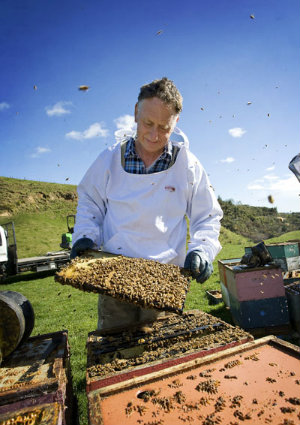‘‘If that means weeding out these cowboys, we are all for it.’’ Neil Mossop

SWEET AND SOUR: Mossop’s Honey owner Neil Mossop is 100 per cent in favor of auditing and accountability to make sure what is in the jar is true to label.
The New Zealand Beekeepers Association is concerned that drums of manuka honey are being exported offshore, then diluted and repackaged using original documentation for financial gain.
President Ricki Leahy said the association had no problem with reputable companies that sent honey offshore to another branch of their business to pack — but ‘‘cowboys’’ were bringing the industry into disrepute.
‘‘I am worried about the honey being exported where we as an industry lose control of our product. I believe that might be where a lot of the cowboy activity may be happening, so it’s being misrepresented overseas.’’
Mr Leahy said he suspected the honey was being blended down to create a larger volume and attain higher prices.
‘‘They are trying to ride on the back of the good values of manuka and are probably still representing it from the original documentation they got.
‘‘There is a lot of manuka honey that is produced and it isn’t the full manuka honey, it is actually brought in as a multifuel blend, if you like, and is possibly being misrepresented as a more pure line of manuka.’’
The concerns come on the heels of Britain’s Food Standards Agency issuing a nationwide warning about misleading and illegal claims made on the labels of honey jars.
Tests by UK, Chinese and Singaporean laboratories revealed many manuka honey products had none of the claimed active properties, prompting industry leaders to crack down on the potentially ‘‘huge fraud’’.
New Zealand manuka honey commands prices 10-20 times higher than other types of honey because of its unique and much vaunted anti-bacterial properties. It is estimated to earn this country up to $120 million a year.
Some of the companies selling mislabelled honey are New Zealand producers and some are foreign. But the allegations have put even the most reputable New Zealand honey producers under the spotlight.
Mossops Honey owner Neil Mossop said they were the oldest and largest locally owned bee keeping company in the Bay of Plenty and had an international trademark brand to protect.
The company was a founding member of the Unique Manuka Factor Honey Association, which represents 38 licensed manuka honey companies.
Mossops was 100 per cent in favour of auditing and accountability to make sure what was in the jar was correctly labelled, he said.
‘‘If that means weeding out these cowboys, we are all for it. In the last year we have had in excess of 400 beekeepers come into the industry that are new and have no prior experience.
‘‘All they are doing is jumping on the bandwagon and hoping to make a lot of money, so they have really got no stake in the industry.
‘‘Mossops are worth tens of millions of dollars and we have a really good reputation and a lot to lose.’’
Mossops had increased its local and New Zealand market by 50 per cent and its international presence by 30 per cent because of great service and high quality products, and that was being jeopardised, Mr Mossop said.
‘‘People are coming in and undercutting us with cheaper pass-off imitation products.’’
Comvita, New Zealand’s biggest manuka honey producer with a market capitalisation of nearly $150 million, is also demanding the industry be cleared of ‘‘cowboys’’.


 UMFHA REGISTERED
UMFHA REGISTERED


